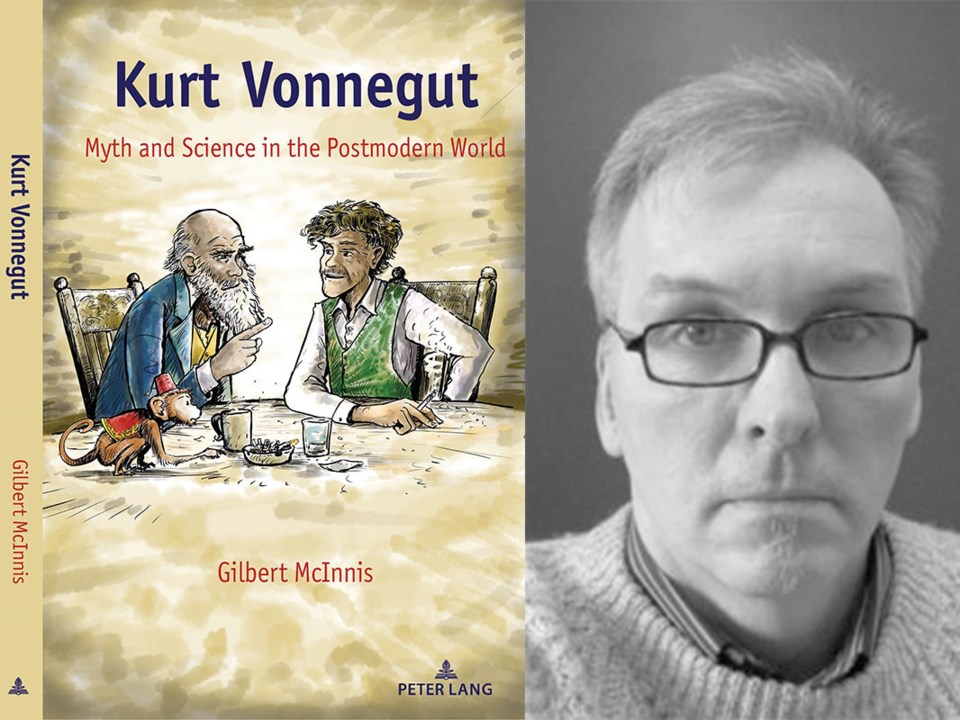University College of the North (UCN) assistant professor Dr. Gilbert McInnis has published a book examining author Kurt Vonnegut’s treatment of the theory of evolution as a widely accepted myth used to explain the world we live in.
“Kurt Vonnegut: Myth and Science in the Postmodern World,” published by Peter Lang Publishing, includes chapters previously published in journals as well as previously unpublished material, says McInnis, who started working at UCN about two years ago.
“I wrote an earlier book 10 years ago about Vonnegut and this is a new book updating some of the material and really looking at the whole idea of myth and science in a postmodern world, which his novels do up until 1985,” said McInnis.
While many people think of myths as ancient tales of Greek gods or other supernatural subject matter, they are actually present in every era and function to help explain to people within a society why things work the way they do and to provide the foundation for societal customs and norms. Another of their roles is to subtly teach people how to lives their lives in accordance with their society’s rules.
McInnis, who wrote his doctoral dissertation on Vonnegut, says the author, who earned a graduate degree in anthropology from the University of Chicago, examined how scientific ideas are integrated into society, particularly in his works published between 1952 and 1985.
“He’s kind of a mixture between Mark Twain and Philip K. Dick in the sense that he’s dealing with science fiction ideas but he’s dealing with them in a very humorous way so you’re always getting a good read in when you’re reading him. He’s very funny,” McInnis says.
McInnis wrote the book over the last two years, revising articles published between 2005 and 2012 and adding new material, thanks in part to a slightly reduced teaching load that gave him more time to write.
“My dean Harvery Briggs allowed me to sit down and put it together,” Mcinnis says. “If it wasn’t for Harvey I don’t think I would have been able to do this because he gave me a credit release for each semester to work on it so credit to him.”
Vonnegut’s view of Charles Darwin’s theory of evolution changed over the course of his career.
“He says in a Playboy interview in 1972 he suspects Darwin is right in his theory but later on in his career, when he published his book of letters shortly before he died, he changed his views and he said no, it’s no longer a good theory and he lost a lot of faith in that explanation,” McInnis says. “He saw the Darwinian narrative as a grand narrative in the sense of a myth.”
Staff at Peter Lang Publishing likened McInnis’s role in writing this book to Dorothy’s dog Toto in "The Wizard of Oz" as he pulls back the curtain on “a myth that has run rampant in the world and brought about great harm. Scholars and students of psychology, sociology, anthropology – and a host of other fields – would benefit from reading the work done by this author in drawing attention to the motivating myths they may be unconsciously living by.”
McInnis, who has already competed two chapters of his next book, “Our Last Mythology,” which he hopes to have finished in 2021, says he thinks “Kurt Vonnegut: Myth and Science in the Postmodern World” will be the most insightful work of his career.
“What makes this book important is it really helps us understand the implications of science in the 20th century and 21st century and what we’re going through today,” McInnis says. “There’s a lot of things that are happening in this book that explain our society.”




